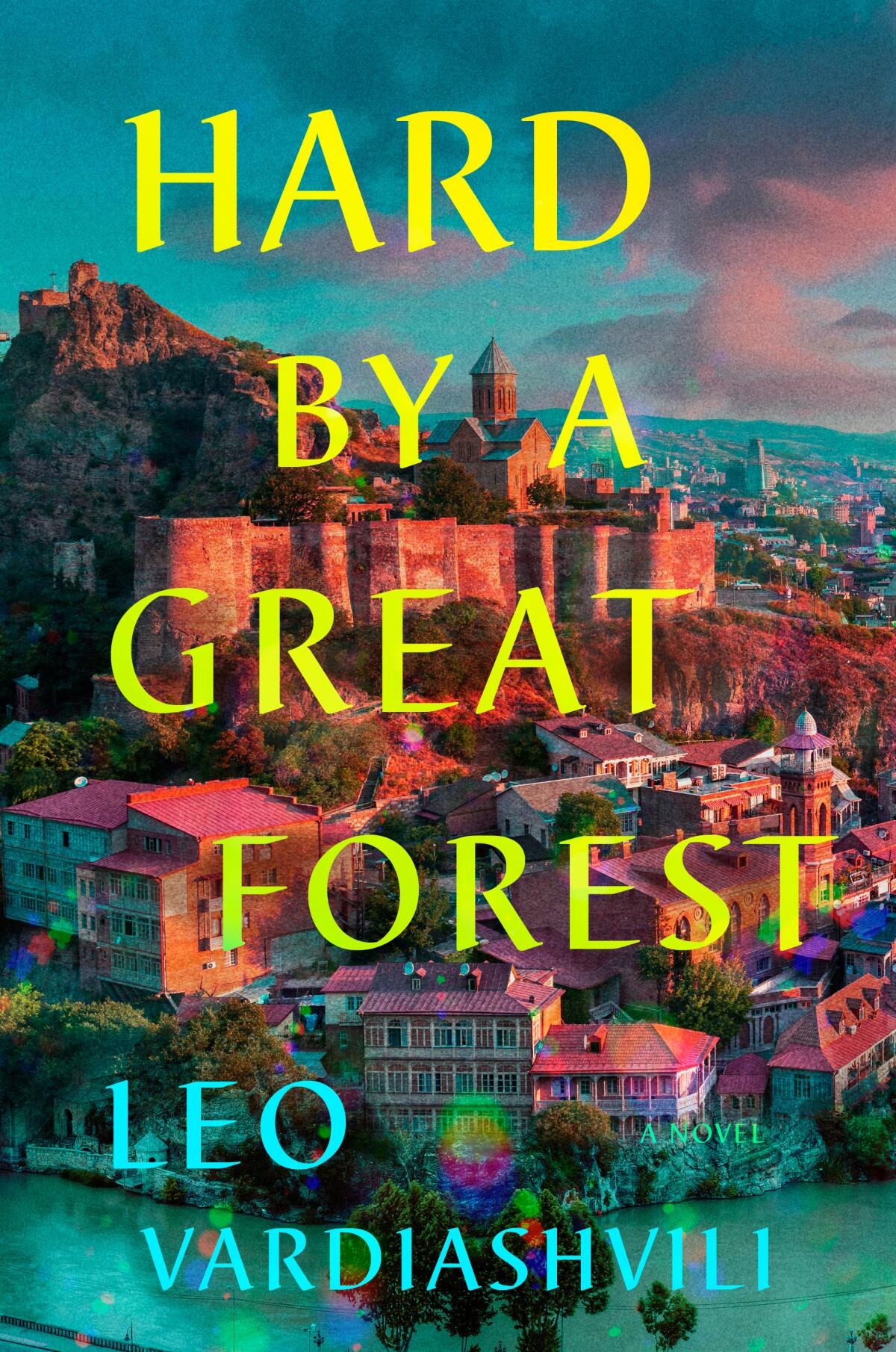A father goes missing. Then a brother too. In this ‘Great Forest,’ a fraught return home

- Share via
Book Review
Hard by a Great Forest
By Leo Vardiashvili
Riverhead Books: 352 pages, $29
If you buy books linked on our site, The Times may earn a commission from Bookshop.org, whose fees support independent bookstores.
When Saba, the narrator of Leo Vardiashvili’s debut novel, “Hard by a Great Forest,” arrives in Tbilisi, Georgia, his mind is as fragmented and troubled as his homeland. It’s 2010, and the country has arrived at an uneasy quasi-peace after a devastating war with Russia, its former Soviet motherland. That conflict followed years of civil war that had already pushed the country to the brink. When Saba arrives, the city is flooded and the animals have escaped the city’s zoo — par for the grim course.
Fitting, then, that Saba arrives under his own storm cloud. Years earlier, as a child, he’d escaped with his father and brother to England. But his mother has died, left behind for lack of bribe money for a visa. Dad recently returned to the country but has gone missing; Saba’s brother, Sandro, searching for their dad, seems to have disappeared too. From the moment Saba hits Georgian soil, the police look askance at his family name — a warrant is out for Dad for attempted murder, he’s told — and seize his passport. “The situation calls for someone with a plan,” Saba thinks. “I didn’t even bring toothpaste.”
Good line. For a novel with such a gloomy setup, “Great Forest” has a commercial-fiction spring in its step. Some of that derives from the fact that Saba narrates in the present tense as he conducts his search through Georgia’s towns and hinterlands, giving the novel some forward thrust. Vardiashvili also has captured the winking, world-weary humor and magic-realist touches that mark a lot of literature from Europe’s war-torn corners, from Czeslaw Milosz’s poetry to novels like Téa Obreht’s “The Tiger’s Wife.” Saba finds a driver, Nodar, who serves simultaneously as a straight-talking exemplar of Georgian fortitude, fellow sufferer (his young daughter has gone missing amid the strife) and comic relief. Quick with a joke and alert to who needs bribing, he plays a self-declared Baloo to Saba’s Mowgli.

Still, Vardiashvili doesn’t want to make this story too glib and frictionless. A comic encounter with a stubborn hippo blocking a road is one thing; a corroded bureaucracy and hair’s-breadth escapes from a Bengal tiger are another, especially when you have only Soviet-era antibiotics to help. Nodar’s radio is always tuned to a station that reads messages from people looking for loved ones; loss is always in the air. Seeking guidance, Saba soon finds his head crowded with the voices of people he’s lost, reminders of grief and deliverers of support, pulling him out of that present-tense momentum. (Memory is always bad news here: It’s a “landmine,” a “knife.”) His drunken childhood neighbor warns him off hospitals. (“The only thing they cure here is breathing.”) A childhood friend speaks to him from the grave, having been shot perhaps due to his urge to protect her.
It’s all a weight on him. “So, what do you do if someone you love gets shot through the chest in a city mid-civil war?” he thinks. Answer: traumatically, anxiously attempt to put the pieces together. He has Nodar as his guide but also some clues that his family has left for him. As he visits old haunts, his father has left behind pages of a Beckett-esque play, and his brother has posted graffiti messages referencing the Brothers Grimm (the source of the novel’s title), Shakespeare, Charles Bukowski. If he can just put the pieces together, he might make his family legacy whole.
Weaving a Dan Brown-esque plot device into a novel of post-Soviet broken-home melancholy feels a lot like filet mignon served with a side of microwave mac and cheese. It’s functional — it delivers Saba from point to point around the country — but it’s hard to feel good about it. This “breadcrumb trail” plot, ostensibly inspired by scavenger hunts that Saba and Sandro played as children, runs counter to Saba’s overall mood of disorientation — his role as Inept Foreigner clangs against the Keen Detective persona. The device also undercuts Vardiashvili’s own talent for clear-eyed assessments of the dismal consequences of decades of conflict. “You can’t walk out of this world,” Nodar cautions Saba, and every oppressive, broken-down byway seems to prove the point.
But to its credit, the final third of “Great Forest” sheds the Encyclopedia Brown-goes-to-Tbilisi dynamic and finds a more lyrical and heartbreaking register. Saba is as thunderstruck by the mountains of the Caucasus as he is emotionally wrecked by ever-deeper examples of war’s consequences. The genesis of the grotesque and child-killing folk figure Baba Yaga becomes all the clearer here; you can believe she lives nearby, in a “shack built from elk bones and roofed with cured human skin.”
The scenes also work because Saba (and Vardiashvili) is testing that idea of whether or not you can walk out of this world. Vardiashvili adds a few surprises to the plot, earned ones, that project if not optimism, something different than an abject submission to cruel fate. War and loss and Baba Yaga and the voices of the old dead are always haunting us. Everything may feel “old, exhausted, chipped, and cracked.” But like the voices on the radio, people can keep speaking out their dreams of rescue. And the book persuades you that sometimes, a form of it might arrive.
Athitakis is a writer in Phoenix and author of “The New Midwest.”
More to Read
Sign up for our Book Club newsletter
Get the latest news, events and more from the Los Angeles Times Book Club, and help us get L.A. reading and talking.
You may occasionally receive promotional content from the Los Angeles Times.







